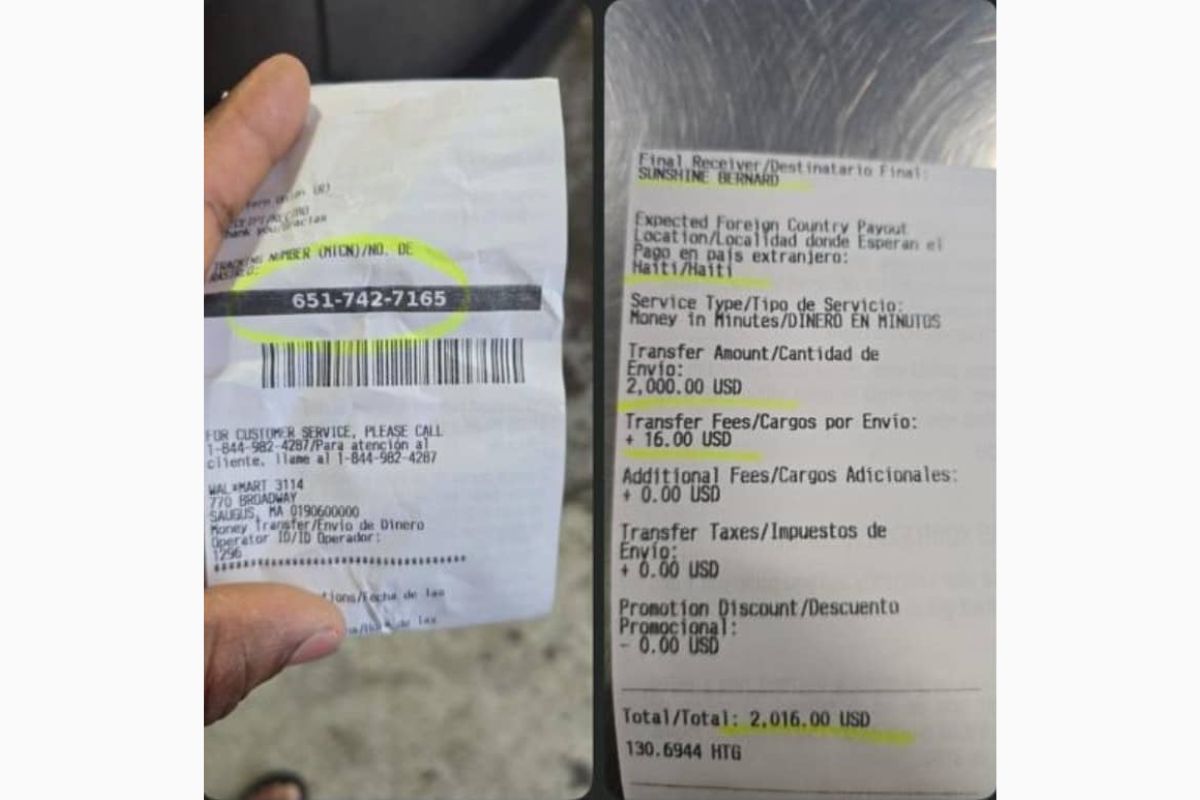In several cities across the country, money transfer houses force their customers to make product purchases to get their money. An abusive practice
Users of transfer companies in Port-au-Prince and in certain towns outside the capital find themselves forced to buy products that they sometimes do not need or pay illegal fees to be able to receive their transfers, according to half a dozen testimonies collected by AyiboPost.
This abusive practice – since Western Union, CAM Transfer or Unitransfer collect substantial fees for sending money – allows branch managers to force the sale of food and other products, often at exorbitant prices.
During the month of February, Givenchy Jérôme, who lives in Anse-d’Hainault in Grand’Anse, traveled by motorbike to the neighboring town of Dame-Marie, where there are the only two transfer houses for miles around.
The twenty-year-old man was trying to receive 50 US dollars transferred from the United States via Unitransfer at an office which also houses a food supply depot.
One of the agents there explained to him that he would only be given the transfer if he bought a bag of rice and a box of spaghetti in the store.
“Shocked”, Jérôme decides to buy the case of spaghetti for 2,200 gourdes so he can receive the rest if his money, cash.
“This displeased me, especially since the transaction I was carrying out was on behalf of another person,” Jérôme told AyiboPost.
Read more: The transfer offices decide the exchange rate and pay in gourdes. It’s theft!
Other clients report instances of overcharging by money transfer companies, in a context where insecurity further accentuates the economic precariousness of Haitian families.
Money transfers received from abroad reached an amount of 3.63 billion US dollars as of September 30, 2024, compared to 3.28 billion in 2023, according to a note on monetary policy from the Bank of the Republic of Haiti (BRH). These figures make Haiti one of the countries most dependent on these types of transfers in the world.
Also in Dame-Marie, a customer who came to collect 100 US dollars for his blind mother at the beginning of February this year via Western Union was offered the purchase of a bag of rice and a box of soaps in order to receive the transfer amount.
The young man’s resolution to only buy the box of soaps for more than 1,000 gourdes was first rejected, then accepted after an intervention in his favor from the director of the establishment.
The client was supposed to return home to Anse-d’Hainault, where he is from, with nearly 13,000 gourdes – according to the current BRH rate – but the disguised extortion and transport costs swallowed up almost a quarter of the amount.
Asked about these irregular requests, the agent complained of a “reduced circulation of money in the country”. He also said his business is financed solely by the store’s sales.
AyiboPost sent a request for comment via email to Western Union and Unitransfer. This article will be updated if these companies react.
Among the half-dozen transfer companies operating in the country, none serves the 36,000 inhabitants of Anse-d’Hainault. To collect their transfers, residents pay 500 gourdes for a motorbike to go to Dame-Marie, which also serves the commune of Irois.
One of the agents in charge of the service explained to him that he would only be given the transfer if he bought a bag of rice and a box of spaghetti in the store.
The local activist Van Vicker Vancol often goes to war against this practice of disguised extortion in the transfer offices in Dame-Marie, which also house food stores.
“You have no choice: either you buy or we don’t give you the money,” denounces Vancol. The scarcity of supply in transfer houses is part of the problem, according to him. “This advantage pushes [the stores] to increase the price of the products that they force you to buy”.
Dame-Marie transfer companies also force certain customers to accept part of their funds via MonCash, which taxes them doubly, according to two residents of Anse-d’Hainault interviewed by AyiboPost.
“Depot Pa Nou”, a transfer branch in Dame-Marie involved in these irregular activities, was contacted by AyiboPost on Sunday March 30, 2025.
Mickson, a manager, mentions “the harsh reality” that transfer companies face in the current environment. “There is a serious liquidity problem in the municipality, and more generally in the country, because of insecurity,” he continues.
To replenish the company’s operating funds, Mickson told AyiboPost that he made a « tiring » journey of more than two hours to Jérémie to find the services of a bank. This dangerous journey, coveted by Désormaux gangs, costs several thousand gourdes.
In 2016, officials from “Depo Pa Nou” were allegedly extorted of more than 800,000 gourdes on this road section. Three years later, the same situation recurred with the loss of a sum of 1,250,000 gourdes.
Because of liquidity problems, Mickson says he has introduced an irregular ceiling amount for transfers. The customer who wants to exceed it will receive, if he accepts, part of the amount in cash and the rest in food provisions.
“This measure allows us to satisfy as many customers as possible, who would otherwise have to travel to Jérémie for this service,” underlines Mickson.
In Saint-Michel de l’Attalaye, in the Artibonite department, the situation is no different.
Since 2021, Ketlain Toussaint has been transferring money to his family in this town from France. She regularly faces these deductions .
Users of transfer houses in Port-au-Prince and some towns outside the capital find themselves forced to buy products they sometimes do not need or pay illegal fees to be able to receive their transfers
A transfer office in Saint-Michel unduly deducted 1,572 gourdes from a money transfer via Western Union made for a member of his family in mid-March 2025. This amount is in addition to legal taxes, including the tax of 1.50 US dollars imposed by the Haitian government on all money transfers to Haiti since 2011.
“This practice is abnormal,” argues Toussaint. “From now on, I send transfers to the Central Plateau for members of my family in order to bypass these direct debits. »
Transfer house security guards sometimes charge large commissions to allow clients access to offices that are already “cash-starved.”
In mid-March this year, a security agent at a transfer office in Saint-Michel de l’Attalaye immediately took 50,000 gourdes out of an amount of 2,016 US dollars that a relative in the USA had transferred via Western Union to a young woman for the finishing of a construction project.
The young woman requests anonymity for security reasons. The agent gave him the money after denunciations published on social media.

Client transfer sheet to Saint-Michel de l’Attalaye, March 2025.
Remy Joseph, a resident of Ennery, forced to go to Gonaïves last December for a transfer due to the inaccessibility of the transfer houses in his commune, was forced to give around 1,500 additional gourdes to the agents behind the counter on a transfer of 50 US dollars. A mandatory compromise to obtain the service.
Some transfer companies are distancing themselves from this irregular practice which continues to grow.
CAM Transfert was contacted by AyiboPost through its customer service number in March. A service agent was categorical: “The company clearly sets out in the transfer forms the commissions or taxes levied on transactions.”
For the manager, “any additional withdrawal is illegal. Customers should not let this happen. We take note and will address this issue.”
By : Junior Legrand
Cover | Photo of the facade of a Western Union office with customers in front of the entrance. (Photo: Unknown)
► AyiboPost is dedicated to providing accurate information. If you notice any mistake or error, please inform us at the following address : hey@ayibopost.com
Keep in touch with AyiboPost via:
► Our Channel Telegram : Click here
► Our Channel WhatsApp : Click here
► Our Community WhatsApp : Click here







Comments